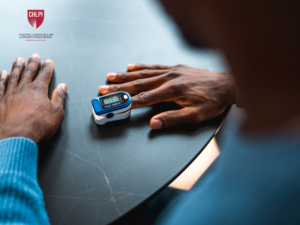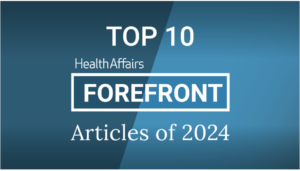Written by Tammuz Huberman, Fall 2017 student in the Food Law and Policy Clinic.

At Harvard Law School’s 5th Annual Food Is Medicine Symposium, one woman was especially prepared for the occasion: she wore scrubs adorned with fruits and vegetables and broccoli earrings. She, along with a captive audience of dozens of people, came to hear about how community groups, food banks, scientists, and policymakers are coming together to help low-income individuals with chronic diseases get access to healthy and medically appropriate food.
The Center for Health Law and Policy Innovation of Harvard Law School co-hosted the event with longtime partner Community Servings, a nonprofit nutrition program in Massachusetts. They brought together a fascinating and compelling roster of speakers that, despite their different backgrounds and organizations, all surprisingly touched on a similar theme: Food Is Medicine makes good business sense.

Emily Broad Leib from Harvard Law School Food Law and Policy Clinic; Robert Greenwald from the Center for Health Law and Policy Innovation; Congressman Jim McGovern, the first recipient of the Food is Medicine Advocacy Champion Award; and David Waters of Community Servings.
Sue Joss, the CEO of Brockton Neighborhood Health Center, a non-profit, multicultural, community health center serving low-income, diverse, medically underserved patients in Brockton and surrounding communities, made an especially powerful case. When Brockton Neighborhood Health Center joined forces with Vicente’s, a local grocery store, both Brockton’s patients’ health outcomes and Vicente’s business improved. As part of their partnership, Brockton and Vicente’s run a cooking program that teaches Brockton Neighborhood Health Center patients how to make healthy foods that taste good and respect patients’ diverse cultural traditions. This program not only helped 84% of participating diabetes patients improve their blood sugar levels, but also found that patients that were taught how to cook were able to sustain cooking practices and the corresponding health outcome improvements even after the cooking program ended. What is good for patients is ultimately good for Vicente’s too: the grocery store experiences strong sales from its partnership with Brockton, and strong profits since fresh produce is typically pricier than other foods. The work these two organizations are doing together is a really incredible—patients are getting healthier, lowering their health care costs and supporting local businesses by putting dollars back into the local economy.
When asked how Food is Medicine interventions fit into our nation’s broader conversations about how best to address the social determinants of health, Karen Pearl, the president and CEO of God’s Love We Deliver, a medically tailored meal provider, made a persuasive argument for including Food is Medicine in these discussions: Food Is Medicine programs are a low cost, high impact intervention for those populations that are not benefiting from traditional healthcare. Pearl and her co-panelist Mark Ryle, the CEO of Project Open Hand, another medically tailored meal provider, are essentially making the business case for Food Is Medicine. When traditional and expensive medical options are not working for a patient, a food intervention is a comparatively low-cost fix that has the potential for really, really big results. And so far, data wholly support this proposition.

As Food is Medicine research results continue to come out, as patients continue to see improvements in the treatment and management of their health conditions, and as healthcare costs go down as a result of food interventions, the business case for Food Is Medicine will be hard to ignore as a legitimate, effective and worthy healthcare tool.
—
Watch the recording of the 5th Annual Food is Medicine Symposium:


